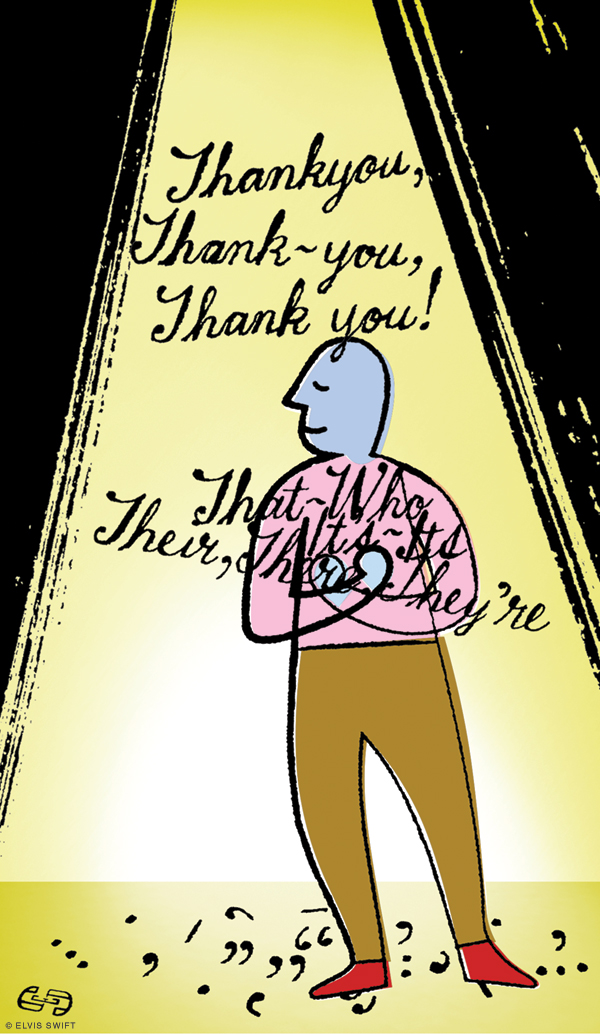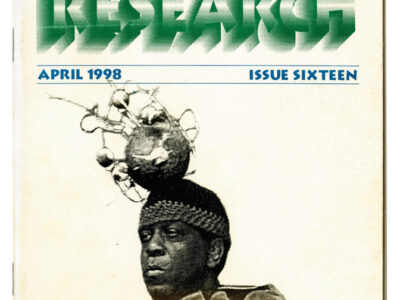
The Angry Grammarian sings.
For about 15 years, on and off, Jeffrey Barg C’02 GCP’10 GFA’10 has written a newspaper column called the Angry Grammarian. If that sounds unlikely, this spring casts Philadelphia’s leading (only?) arbiter of apostrophes in an even more improbable role—as writer and impresario of The Angry Grammarian: The Musical. The decade-long dream, for which Barg wrote the music and lyrics, is coming to fruition with a little help from Penn friends. The show is being put on by Pier Players Theatre Company, cofounded by Chelsea Cylinder C’17, with Noah Lee EAS’19 as the technical director and Jamie Warrick C’18 stage managing. The titular role will be played by Ben Behrend C’16. Performances run from March 7 to March 16 at Theatre Exile in Philadelphia. Gazette senior editor Trey Popp caught up with Barg in January to ask him a few questions.
When and how did you originate your alter ego as the Angry Grammarian?
It was around 2007, when I was an editor for the Philadelphia Weekly. Riding on the coattails of heroes like Lynne Truss and William Safire, I pitched a weekly column about grammar, language, and punctuation. All my colleagues thought it was a terrible idea. But they let me try it anyway, and it turns out there’s a larger audience for a grammar column than one might think. I decided to start turning it into a musical in 2014, and in 2018 I rebooted the column for the Philadelphia Inquirer, where it’s been running ever since.
Whence the anger? And would the AG, let’s call him, have scorned or applauded a verbless question beginning with the word whence?
Whence your anger? Usually the ex-pression “If you’re not angry, you’re not paying attention” applies to, shall we say, weightier matters, but language is important too. And it’s not just me: just a few months ago, a study in the Journal of Neurolinguistics found that for some people, when they encounter a sentence with bad grammar, their bodies have a physiological reaction similar to if they’re being chased by a tiger. Heart rates change. Stress increases. In other words: there’s a good reason why we’re like this. As for “whence,” it’s precise and concise, and old words are fun. So you’re in the clear.
Grammar has a curious capacity to rouse passions. Has writing a combative column about it led to any memorable arguments or exchanges over the years?
Oh yeah. I usually use grammar and language as a lens to comment on news and politics. Depending on the week, my inbox can become a fetid cesspool of prejudice and hate. Readers tend to disagree with my politics more than they disagree with my grammar, but I get plenty of vitriol for both. Perhaps no topic has aroused more passion than the question of how many spaces—one or two?—follow a period. The correct answer is one; the word processors that we all use automatically insert extra space after a period, so if you put two manual spaces in addition to that, you’re left with gaping white holes on your page. But most people learned two spaces on monospaced typewriters, and that’s a hard habit to break. So of course one of the songs in the musical is called “The Right Space,” and it tackles that very problem.
How did you get the idea that grammar could form the basis of a musical—and a romantic comedy, no less?
Back in the early days of the column, I did a short-lived, not-very-good Angry Grammarian podcast. Like a lot of the internet in the 2000s, it was weird and formless: one week I’d interview an author, and the next I’d walk around Philadelphia asking if anyone could spell Schuylkill. There were a few weeks when I wrote grammatical parodies of popular songs, which were always fun for me. One day my old college friend Ben Kamine C’05, with whom I’d done theater, asked if I thought the Angry Grammarian could be the basis of a musical. Remembering those parodies, I thought it could. And what could be more romantic than grammar? The show isn’t autobiographical, but back in my 20s, I may or may not have written about language to try to get dates.
You cast a younger Penn alum, Ben Behrend, as the title character. What made him right for the role?
The Angry Grammarian is kind of a jerk, but you need to root for him, and Ben brings this immense likability. Plus he has a killer singing voice.
It’s hard to imagine something more challenging to pitch to a producer or theater troupe than a musical about grammar. How did you manage to bring this to fruition, and what advice would you have for anyone else with a longshot idea for turning an offbeat passion into a play?
It was a lot of telling anyone who would listen about the idea, and being confident in the work and in my collaborators. We did a couple development workshops that helped improve the show, and—just like a grammar column had a bigger audience than my old colleagues predicted—I’m hopeful that the same will be true of a grammar musical. Some people are drawn in by the language hook, but the themes of finding connection and understanding how we communicate with each other are universal. Plus—and this isn’t true everywhere, but it’s one of my favorite things about Philly—the traditional rules of cultural gatekeeping don’t really apply here. If you want to make a show in Philly, you can just do it—you don’t have to get “permission.” Pier Players, the company putting on the show, is a young company of friends who just decided they wanted to make theater together, and they’re leading the fundraising. Theater rentals are relatively affordable, and theater people are really good at taking cardboard and chicken wire and turning it into art.
At the risk of courting a spoiler alert, does the Grammarian find true love? And is he still angry?
I won’t spoil it, but I will say that by the end, he understands that love isn’t the only important thing he was looking for. He’s still angry, but it’s a more productive anger.




